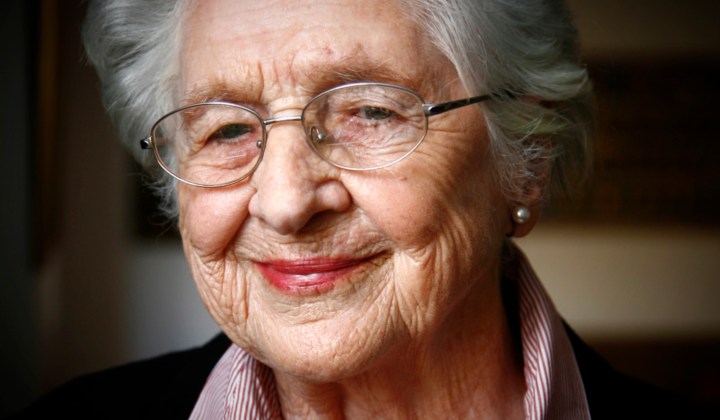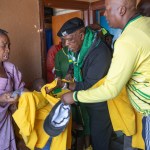Elsa Joubert (1922 – 2020)
One woman’s brave quest to preserve humanity and discard racial selfishness

Writer and activist Elsa Joubert, who died of Covid-related causes in Cape Town on Sunday at the age of 97, was a blessing to our country and to its beloved and cursed linguistic problem child, Afrikaans.
Elsa Joubert was born in 1922 in Paarl, the cradle of Afrikaans, three years before the official acceptance by the South African government of the language’s existence. To a very large extent, her life was a juxtaposing of her love of the language to its evil usage and co-option by a government dedicated to denying and throttling the humanity and very existence of its citizens through the doctrine of apartheid.
It was a doctrine Joubert despised and opposed, in public and in her private life, leading to heartbreak, isolation and rejection by many white Afrikaans speakers, especially in the north of the country. Reading through her extensive oeuvre, one can see that she could not breathe, that she cared about what mattered most – the other, those of a different hue than her own, which surely must be the litmus test for placing humanity above self-interest.
It may well be argued that mere opposition was not enough; that the struggle should have been joined. One person who believed passionately that Joubert had not done enough in the battle against apartheid was Elsa Joubert herself. In her brilliant final book, entitled Spertyd (Deadline) – published when she was, would you believe it, 94 years old – the regret at not having done more is a golden thread binding the text.
But actually, like many people who believe they have not done enough, she had done plenty. Of the rich harvest of fiction she penned, our founding president, Nelson Mandela, loved Die staf van Monomotapa (The rod of Monomotapa) best, as Madiba said when Joubert was awarded the Order of Ikhamanga (silver) by President Thabo Mbeki.
I hate to differ from Madiba, but for me, among her best works of fiction was her pioneering and trail-blazing trilogy focused on decolonisation, namely the provocatively titled Ons wag op die Kaptein (We await the Induna), which was published in English as To die at Sunset to a rather breathless review in The Times Literary Supplement, Bonga and Die laaste Sondag (The last Sunday). It may be too much to hope for, but given Ons wag op die Kaptein’s content, quality and publication date (1962), it may serve the EFF’s rather inspiring lockdown book club well to have its members discuss the overlap and differences between the decolonisation writings of Joubert and Frantz Fanon. They may very well be extremely surprised and broaden their horizons.
I hate to differ from Madiba, but for me, among her best works of fiction was her pioneering and trail-blazing trilogy focused on decolonisation, namely the provocatively titled Ons wag op die Kaptein (We await the Induna), which was published in English as To die at Sunset to a rather breathless review in The Times Literary Supplement, Bonga and Die laaste Sondag (The last Sunday).
Her best-known work is Die swerfjare van Poppie Nongena (The Nomadic life of Poppie Nongena), which is often listed as one of the top 100 books to come out of Africa. It is surely the Afrikaans book most black South Africans have read of their own volition. It tells the story of South Africa’s racialised migrant labour system, of how so many South Africans were dehumanised into foreigners in their own land by the evil system of homelands and preferential labour zones. It is a gut-wrenching story, told simply and crisply. It was adapted to a stage production which shattered the colour bar at the apartheid citadel called the Nico Malan Theatre in Cape Town (currently known as Artscape) when Nomsa Nene was cast in the title role and just blew audiences away. This past year, it was made into a truly magnificent movie by Christiaan Olwagen, starring Clementine Mosimane in a tour de force all must see.
But perhaps Joubert’s greatest contribution is her autobiography, published in three parts, namely ’n Wonderlike geweld (A Wonderful Violence), Reisiger (Traveller) and Spertyd (Deadline). It is a journalist’s provocative journey through fully 85 years of rich African and South African history, from testing the British colonial colour bar in Kenya to the present day. It is a triumph of memory against forgetting – of one woman’s brave quest to preserve humanity and discard racial selfishness. It is nothing short of a revelation.
… perhaps her greatest contribution was and might yet be attempting to change the thinking of callous South Africans – a quest to restore humanity and caring to the mind of power-drunk, despotic rulers.
But let us have her speak for herself, and let us admire her crisp, clipped sentences. I have translated the following passage from Reisiger, the second part of her autobiography, and it describes an appearance by Dr Hendrik Verwoerd – whom she despised – at the function where she was awarded the Hertzog Prize – the premier Afrikaans literary award – for Ons wag op die Kaptein:
“The airconditioning in the enormous hall has tripped and it is a cold, tortuous function. The main speaker is Dr HF Verwoerd. It is the first speech of his I attend since he was shot (at the Rand Show in 1960). He has been briefed on the themes discussed at the recent congress of the South African Academy for the Arts and Sciences. Newspapers reported at length on every day’s proceedings. I listen to him. I am astounded. Like a conjurer he grabs the themes, swings them around, turns them inside out, proposes a new perspective, sums up brilliantly and washes you away to his new conclusion. I have never been a fan of Dr Verwoerd – quite the contrary – the letter he wrote to my Uncle Klaas still riles me, but I have to admit he is brilliant. I can well imagine how he strings along Parliament and his caucus. I am cold in this hall. But the chill is not merely physical. Verwoerd’s clinical, clear, logical solutions to the problems the Academy had struggled with, his impersonal but brilliant reasoning and oratory, his juggling the minds of the audience to his liking and his likeness, scared me. His ability to convince his audience is catastrophic.”
That said, perhaps her greatest contribution was and might yet be attempting to change the thinking of callous South Africans – a quest to restore humanity and caring to the mind of power-drunk, despotic rulers.
The first example I wish to cite was when Joubert and her husband, the late Klaas Steytler, teamed up with a family member who was a progressive opposition MP, in April and May 1976, to try and warn an arrogant, uncaring Nationalist Party government of the calamity about to engulf Soweto due to the inhumane instruction to use Afrikaans as the compulsory medium of instruction in schools, thus condemning the pupils who could not speak it, and the teachers who were not proficient in it, to perpetual serfdom. They petitioned the government, they tried to convince pompous, mediocre Cabinet members, and they failed. As we all know, on 16 June 1976, disaster ensued in Soweto, because an indifferent government would not agree to the call of the vulnerable.
Perhaps, then, it is apt that Elsa Joubert’s final epistle, published just days before her death in Die Burger, was a plea from the heart on behalf of everyone who, like her at the time, finds themselves living in old age homes and are banned by our government from visits by their families, even as the dusk of life descends. Hauntingly, she tells of how their only wish was to touch and see and be with their loved ones, and begs an uncaring government to care about its most vulnerable. Would they relent? Could they care? Of course not… this country’s people have only ever advanced despite its governments.
And now, she is dead. Might it awaken some degree of humanity in our current rulers? That would be surprising and liberating to all concerned. But in the absence of any sign of caring for the vulnerable, let this be known: All people die, but not all people ever truly lived. Elsa Joubert lived. Elsa Joubert led. And all of South Africa is the richer for it. DM


















